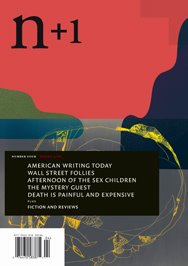
The newest issue of n+1, Reconstruction, arrived on Tuesday, and it’s a thick one. The Intellectual Scene column chronicling the piquant cultural ruminations of our hapless, misanthropic, and nameless narrator has been interrupted, apparently as a result of fact that "our culture and everyday life may not exist in their current form much longer." He will, if we are lucky, likely return for issue # five.
But the gauntlet has been dropped, and this interruption prefaces a piece by Chad Harbach on the ever-contentious and now au courant debates concerning the threat of Global Warming. That we have crossed the point at which reversal is no longer an option; that our technological capabilities and our capitalist market economies disregard both social and environmental externalities; that having escaped, if only for the time being, the threat of mutual nuclear destruction has afforded us a comfort only borne of complacence is essentially what Harbach’s getting at. And now with climate patterns varying wildly - floods, hurricanes, tornados, sun nearly every day in February (in Ontario) - the thought that it is not each other we should fear but, instead, mother nature's impending wrath or revenge, what have you, is the comeuppance we'll deserve.
Meanwhile, I haven't looked through the entire issue yet, deferring to read and savor it in portions, but it's turning out to be one of the more interesting issues. The flame war between critic James Wood and novelist Jonathan Franzen continues with a Franzen letter to the editors. Franzen is incredulous to Woods imputation that he practices a “Thin Aestheticism.”
The first salvo, if it could be called that, was Wood's review of Franzen's The Corrections for the New Republic. In it, Wood invoked Franzen's infamous Harper's essay, a lamentation on the diminishing possibility of the Social Novel, which he called "intelligent" and "affecting" but also "long" and incoherent. Of Franzen's solution, now having relented on the idea of a Social Novel altogether, Wood detected a "Thin Aestheticism" in Franzen’s tone; Franzen's tacit intention was now, as he saw it, "To write sentences of such authenticity that refuge can be taken in them."
And it was back in issue # three, Reality Principle, in which Wood was replying to the editors’ churlish assessment of the negative tendency literary criticism had taken, that Wood re-invoked Franzen's "Thin Aestheticism". Although, to be fair, he believed that Franzen couldn't really adhere to something of the sort. Franzen has taken exception to this by responding that he'd like to admire Wood but can't really trust him. At one level Franzen has misread Wood and Wood has misunderstood Franzen. Yet on another, they disagree on the means, though the constituent parts of a novel turn out to say something social nonetheless.
Further on in issue # four we get a trenchant survey of American Writing Today, of which Keith Gessen's essay on Money and publishing is a must read. On balance, the issue seems a strong one.
